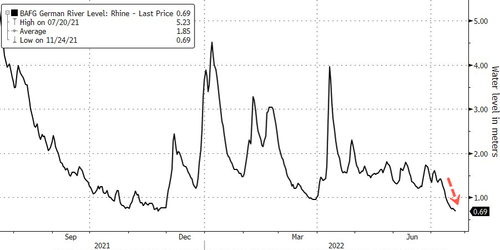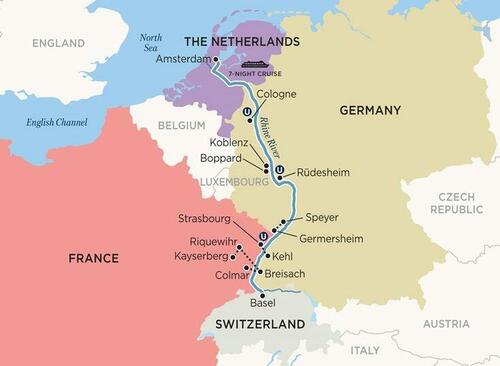SOURCE:
Rhine Water Levels Drop Below Critical Threshold That Could Halt Barge Traffic | ZeroHedge
Water levels on the River Rhine have steadily declined and fallen to emergency levels this week, indicating more headwinds for the German economy already careening towards recession.
One of the most vital waterways in Europe's economic heartland is below a very important 78 centimeters (31 inches) threshold at a measuring station in Kaub, Germany. As of Wednesday, Kaub sits at 68 centimeters (27 inches) and is dropping fast, indicating that barge transport disruptions could be imminent.
Riverlake, a vessel broker, already says barges hauling goods between Upper Rhine from Rotterdam have reduced weight to about a third of capacity to improve draft in shallow parts of the waterway, according to Bloomberg. For some context, barges on inland waterways haul about 5%-10% of German freight, with about 80% of that on the Rhine, including a third of domestic shipping of crude oil, natural gas, and coal, Berenberg economist Salomon Fiedler wrote Wednesday in a note to clients.
Citing a report by the Kiel Institute, Fiedler said if Kaub sustains water levels below 78 centimeters for several weeks or longer, German industrial production will be "about 1% lower than in a month with no low-water days." He said the following month would be an impact of 1.5%.
The water crisis on the 800-mile (1,288-kilometer) river that runs from Switzerland to the North Sea is similar to the one in 2018. The previous crisis resulted in transport disruptions that hit industrial production. One noticeable difference is the economy today is sliding toward a recession as it contends with an energy crisis, high inflation, faltering economic growth, and supply chain bottlenecks -- unlike anything ever seen before.
Germany's economy grew by a paltry 0.2% in the first quarter, just barely escaping a technical recession following a contraction in the prior quarter, while the inflation rate printed a mind-numbing 7.6% in June. Alarming signs of stagflation are developing, and hyperinflation of energy prices thanks to Europe's sanctions on Russia is the leading cause of the economic turbulence. A recent flash purchasing managers' index shows the rapid deceleration in Europe's largest economy.
"On the one hand, Germany is most likely sliding into a recession already. This would suggest that industrial production and the need for shipping would be lower anyway, reducing the sting of low water levels.
"Supply chains were already under heavy stress and inventories depleted after two years of pandemic-related disruption. The ability of firms to absorb delays in transportation is probably more limited than normal," Fiedler said.
Earlier this week, we first pointed out the emerging crisis in a note titled "Germany's Energy Crisis About To Get Even Worse As Rhine Water Levels Plummet." The countdown has begun as Kaub's water levels are below a threshold that, if sustained through mid-August, could reduce barge activity on the waterway and worsen the economic outlook.


No comments:
Post a Comment
Note: Only a member of this blog may post a comment.